
March 12, 2024
The decision came after a 7-hour meeting and weeks of organizing by resident and student org Claremont Community for Palestine
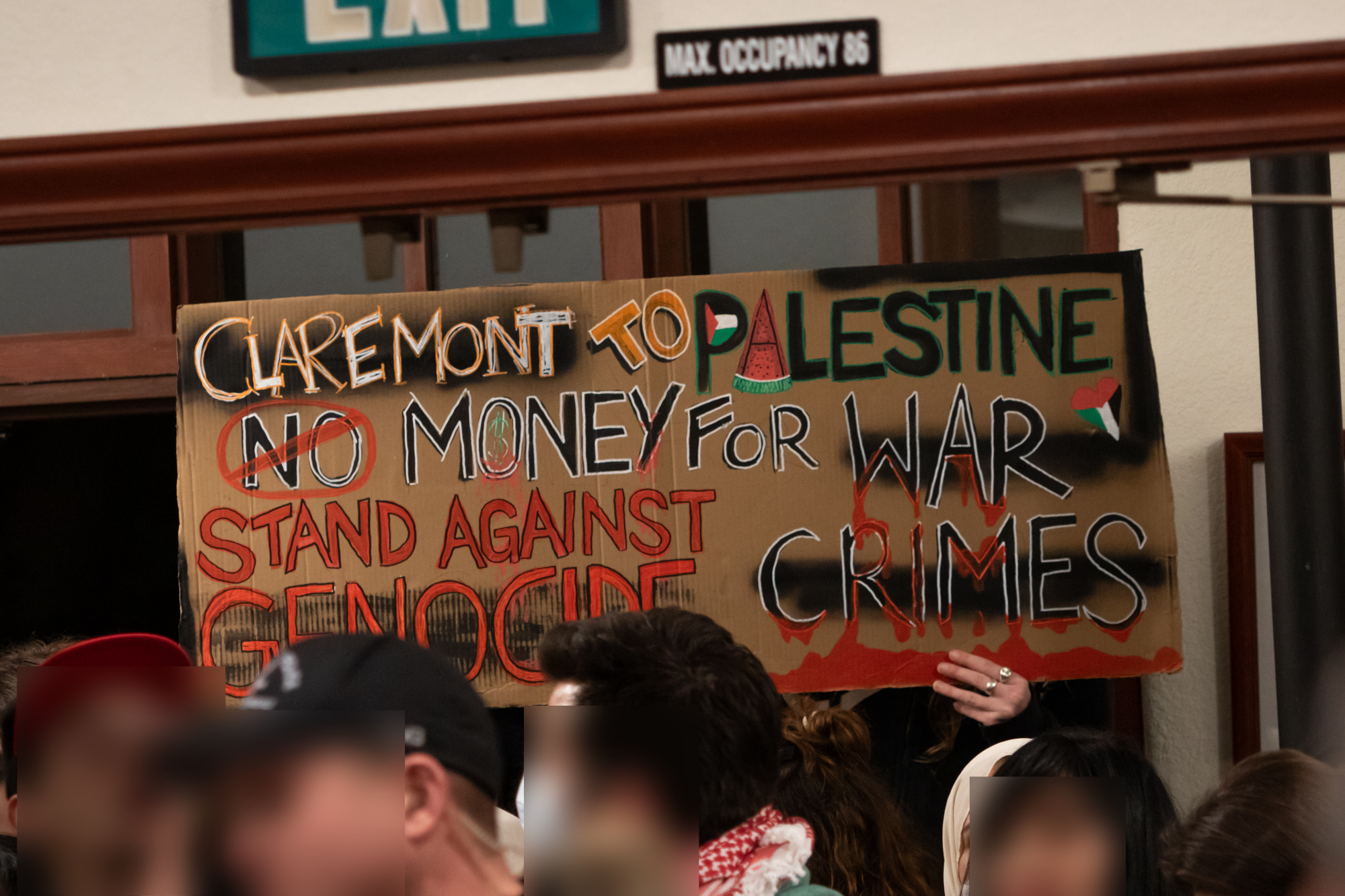
On Tuesday, Feb. 27, over 70 Claremont community members, students, and faculty gave speeches at a Claremont City Council meeting urging the council to adopt a ceasefire resolution. Despite the fact that 72% of the 100 total public comments were in support of the ceasefire resolution, the seven-hour meeting concluded at 1 a.m. Wednesday with the Council unanimously voting down the resolution.
CC4P, along with community organization SoCal for Ceasefire and Claremont Students for Justice in Palestine, led dozens of students and community members from Honnold Mudd Library to Claremont City Hall prior to the meeting.
There, they found a group of over 40 attendees already present and crowding the doors, some of whom held signs saying “Claremont Stay Local.”
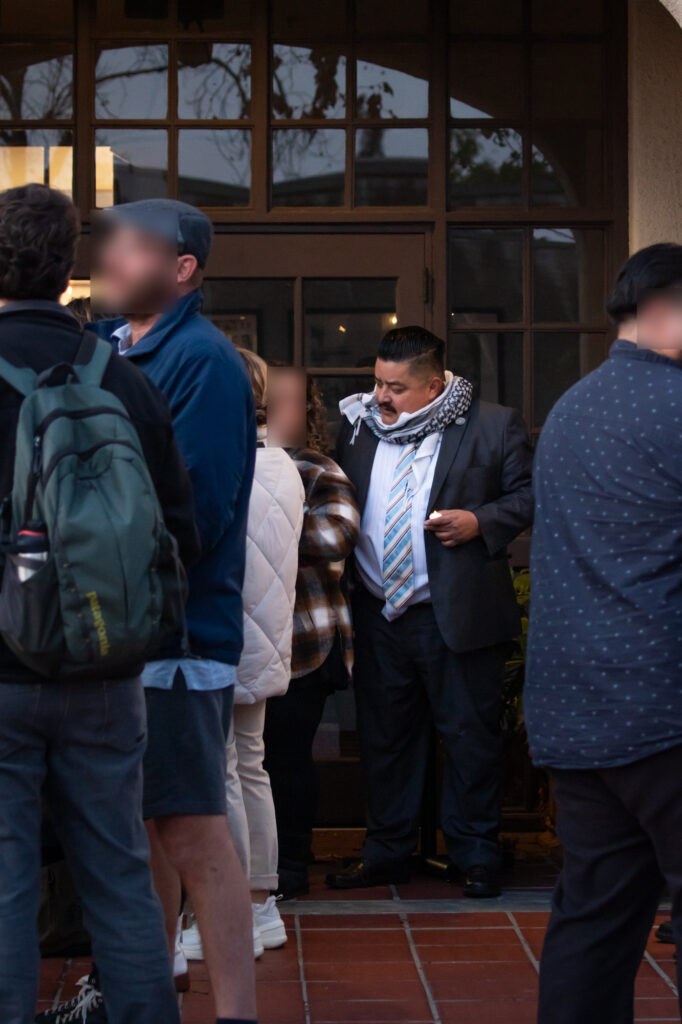
Tensions rose after one member of the earlier-arrived crowd physically blocked Jaime Gutierrez Esq., a civil rights attorney and organizer for Socal for Ceasefire, from entering the building after the doors opened at 6:15 p.m. Ultimately, the earlier-arrived group all took seats in the hall prior to anybody from the CC4P walkover entering, leaving fewer than ten seats left.
In a Feb. 28 press release, CC4P referred to the crowd as “Zionists,” and wrote that they “blocked the entrance of the chambers … forcing families with young children to sit outside,” and also recorded and “verbally harassed” pro-ceasefire attendees.
Undercurrents reporters witnessed several anti-ceasefire attendees appearing to record pro-ceasefire attendees on their phones. On one occasion, when a student blocked a phone camera using a sign, the recording attendee attempted to grab the sign from their hands.
One anti-ceasefire attendee told Undercurrents at the city hall that they were not organized in any official capacity, beyond word-of-mouth community concern. However, 170 out of over 300 written comments about the resolution that the city received were copies of the same email writing against the ceasefire resolution. 58 of the comments followed a CC4P template.
The anti-ceasefire email claims that “one of the main reason [sic] why protesters want a local ceasefire resolution is to fuel hatred against Jews and Israelis in our community,” along with an unattributed claim that “antisemitism has increased by 400% since October 7th” and extensive quotation from the 1988 Hamas charter.
“Witnessing the targeted destruction of entire families in Palestine and doing nothing about it is an intolerable stance,” the pro-ceasefire email writes. “City ceasefire resolutions shift narratives and exercise more leverage and affirmation to our federal representatives than one email or phone call ever could.”
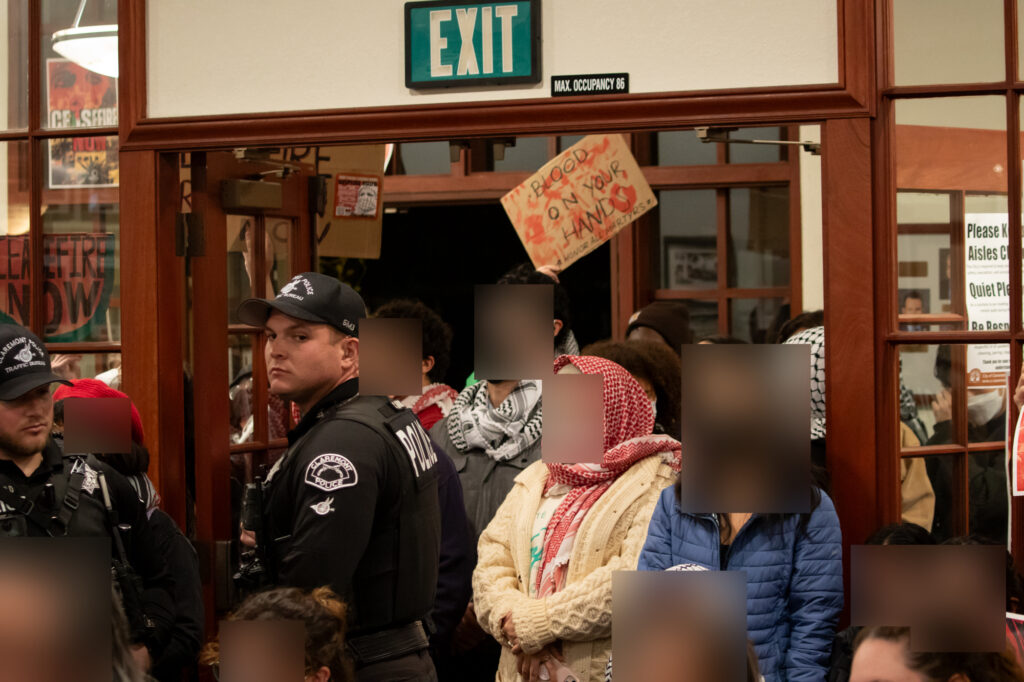
Kenny, a Pitzer student and organizer with CC4P, who asked to be identified only by their first name for safety reasons, noted that there was a much heavier police presence at the Feb. 27 meeting compared to the Feb. 13 one.
In addition to two officers in the same position at the front of the room as at the Feb. 13 meeting, two additional officers were guarding the doors throughout the Feb. 27 meeting, which grew to 10 officers by the end.
At around 12 a.m., a student noticed a non-uniformed person sitting in the hall with a holstered handgun on their belt. When notified by a CC4P organizer, a city council staff member said that the armed audience member was an undercover police officer.
“Students and community members were really frightened,” Kenny said. “Immediately we wanted to prioritize the safety of everyone in the room first and foremost, before any vote.”
Councilmember Stark put the ceasefire resolution on the agenda at the previous City Council meeting on Feb. 13, after resident and student group Claremont Community for Palestine (CC4P) mobilized more than 80 Claremont community residents to show up in support at the prior City Council meeting.
At the same meeting, Councilmember Calaycay also agendized an alternative resolution to codify into policy what he called the Council’s “longstanding practice” of not issuing resolutions on “social and political issues that are not local to Claremont.”
At the meeting, CC4P submitted to the council a position letter supporting the ceasefire resolution sponsored by 21 organizations, including the Islamic Center of Claremont, the Arab American Civic Council, three Jewish Voice for Peace organizations, Claremont Tenants United, Veterans for Peace, and seven additional Claremont student organizations. They also submitted a petition with 356 signatures.

The portion of the meeting dedicated to these two resolutions began with a member of City Council staff presenting the staff’s recommendation, which was in favor of resolution 1a, to codify the unofficial prohibition on non-local resolutions.
“The city receives several requests for proclamations and or resolutions each year on issues over which the City Council has no jurisdiction, and the city cannot realistically accommodate every request,” said Katie Wand, assistant to the city manager, before public comments began. “Preparing well-researched, well-drafted proclamations and resolutions and conducting related public outreach would require a significant commitment of staff, time and resources. The city currently does not have the staff resources to regularly create proclamations and resolutions for matters that are not local to Claremont and over which the City Council has no authority or jurisdiction.”
Many supporters of the ceasefire resolution argued that local government is their only option when state and federal governmental bodies aren’t listening, and pointed to precedent in over 70 other cities of all sizes who have passed ceasefire resolutions already.
“Our LA County neighbor Cudahy, a city with a smaller population and a budget almost half the size of Claremont, was one of the first to pass a ceasefire resolution,” Kenny said in his comment to the council. “Lower-capacity resources is not an adequate reason. Cudahy Mayor Lomeli argued that a ceasefire resolution allows its community to know that the City does not stand with oppression.”
A student who described themselves as the grandchild of two Holocaust survivors emphasized how the ongoing genocide in Palestine is, in fact, a local issue.
“You have Palestinian constituents that you work for and are responsible to. This issue is local to them. You have anti-Zionist Jewish constituents like me that you work for and are responsible to. This issue is local to us.”
Dr. Bilal Nasir, a professor of Asian American Studies at Pomona College, called out some anti-ceasefire comments for espousing anti-Black and anti-Muslim racism in his public comment, including someone who said they were “nervous” because pro-Palestine speakers were “angry” and “driven by emotion.”
“Some of what, unfortunately, I’ve heard here today is steeped in the very same Islamophobia and racism that has made Muslims, Arabs, Black Americans, Indigenous people, Latinos, among others, targets of violence,” said Nasir. “Someone mentioned earlier tonight you’re nervous about walking out of this room because the people in the back are emotional and unpredictable. Is that because the Black and Brown people are in the back of the room?”
Ultimately, all five members of the council voted in favor of resolution 1a, to codify their practice and ban all future “non-local” resolutions. In closing remarks, councilmembers re-affirmed the reasoning that the city of Claremont is the wrong forum and level of government to hold accountable for the actions of the federal government.
“We heard a lot of people say that in the time that this meeting happened, more lives have been lost. And so I ask you, why then are you spending time on a symbolic ceasefire gesture instead of working directly, directly where you can end it?” Stark said. “This is not going to be solved here, in these chambers. And what a ceasefire would do in our city is cause increased division.”
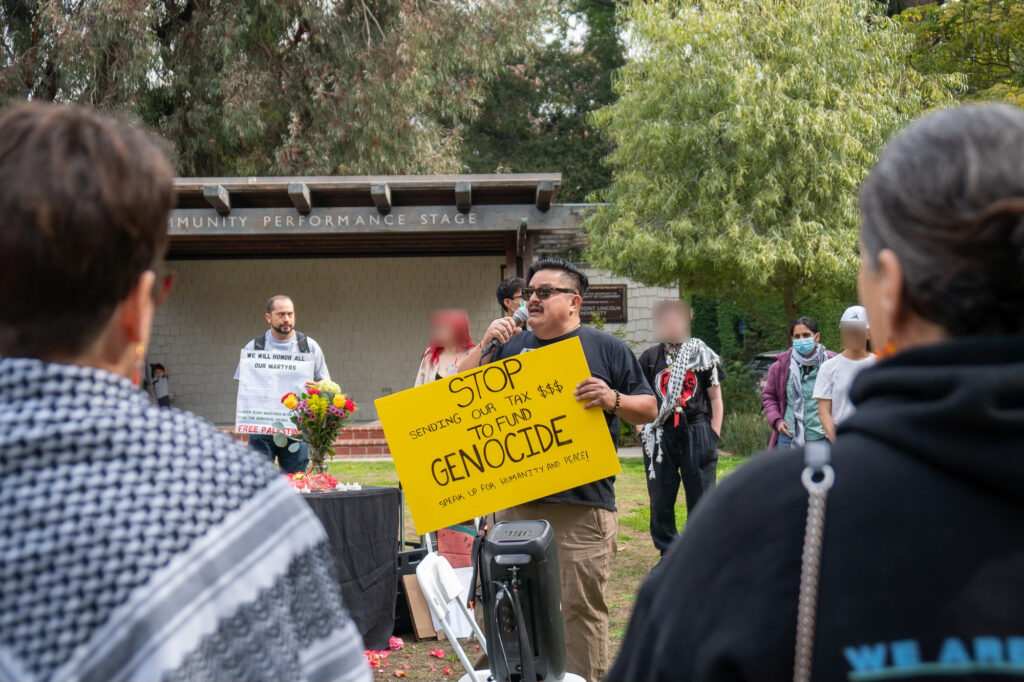
In a Feb. 28 press release following the vote, CC4P wrote that its “community members are organized, disciplined, and ready to continue holding Claremont’s representatives accountable to Palestinian liberation,” and said that the vote would not be the end of the road for the organization. The same day, the group organized a civic engagement workshop with the Arab American Civic Council to discuss the campaign and its goals.
On Sunday, March 10, 60 community members attended a vigil hosted by CC4P at Shelton Park in the Claremont Village to memorialize Palestinian martyrs and Aaron Bushnell, an active-duty Air Force member who self-immolated in front of an Israeli embassy in protest of the US complicity in genocide.
Many community members gave speeches about what mourning Bushnell and the over 30,000 Palestinians who Israel has killed since Oct. 7 means to them.
“I will not stand in silence when I see the haunting images from Gaza, the reflections of the black and white images from the European concentration camps,” said Millie, who identified herself as an Israeli-American Claremont resident and granddaughter of Holocaust survivors. “Never again means never again for anyone. And when I witnessed the Israeli government inflicting the same horrors upon Palestinian people, I have a responsibility to speak up.”
Kenny told Undercurrents before the meeting that Claremont residents’ gaze will stay fixed on Palestine and the genocide in Gaza regardless of the outcome.
“If the city of Claremont decides today that they want to be a city that stays silent, not just with this genocide, but with every future mass atrocity that affects their community members here—if they want to decide that, I guess they should expect to be held accountable for that,” Kenny said. “There is a strong base from a wide variety of constituents and community members who stand in solidarity with Palestine, and I think that energy will only increase regardless of what happens today.”


Palestine
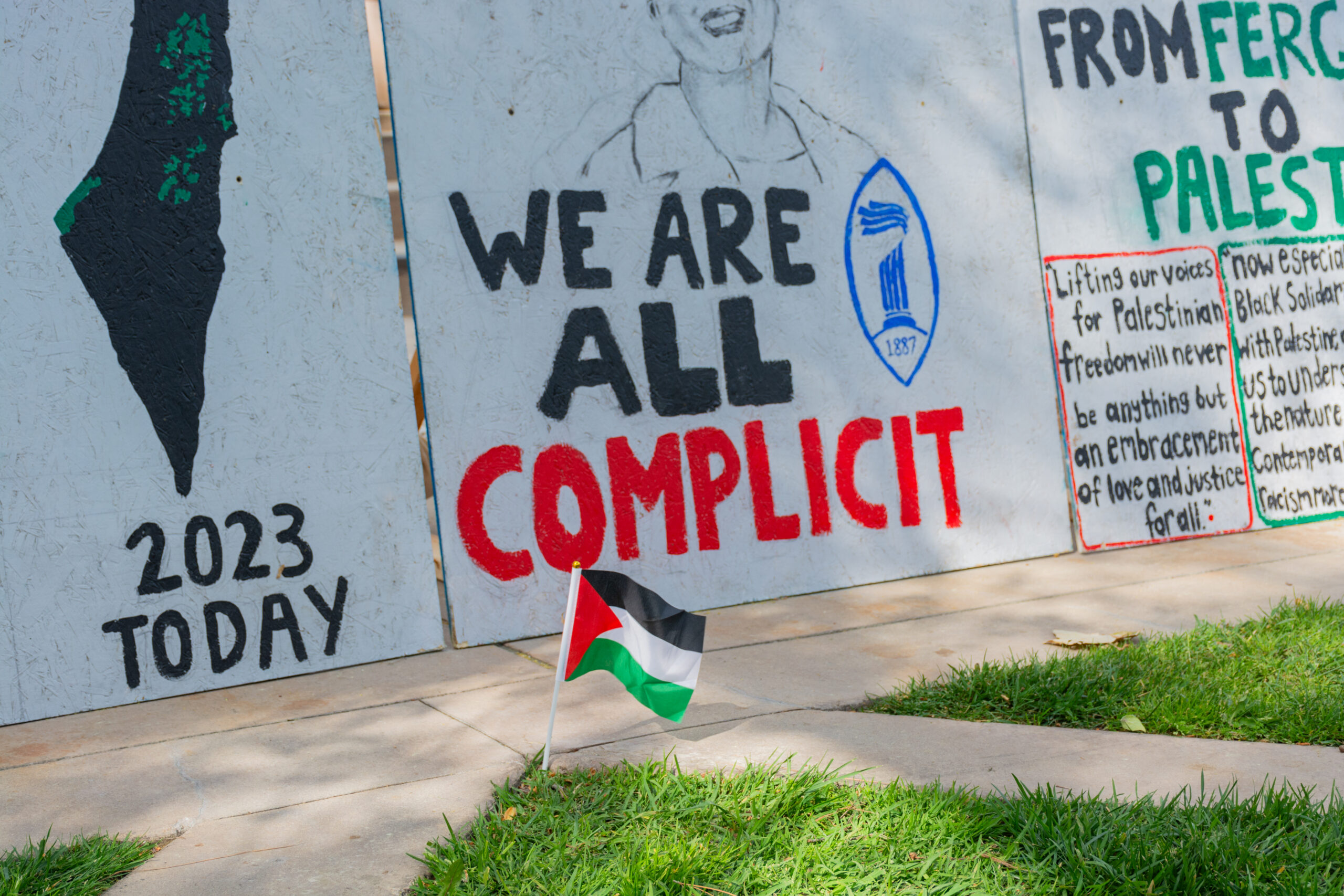
Palestine

Palestine

Undercurrents reports on labor, Palestine liberation, prison abolition and other community organizing at and around the Claremont Colleges.

Issue 1 / Spring 2023
Setting the Standard
How Pomona workers won a historic $25 minimum wage; a new union in Claremont; Tony Hoang on organizing
Read issue 1